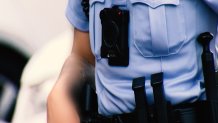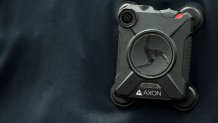A demand for more body-worn cameras has been among the calls for police reform during the recent protests in cities and towns across the country.
Police departments throughout the Philadelphia region have been outfitting their officers with body cameras over the last several years. But for the most part, the cameras aren't yet used universally.
“We know from history that police can’t police itself,” Asa Khalif, a Black Lives Matter activist in Philadelphia, said in his call for all officers to wear body cameras. "So we need full transparency."
But even if all cops were to have body cameras, transparency is not guaranteed. The cameras need to be on and the video needs to be properly stored for the cameras to be effective. That’s something that activists and lawyers say is not happening in Philadelphia.
NBC10 obtained a memo sent to the city's police department last year that details big flaws with their body camera program.
The memo, produced by the Defender Association of Philadelphia, included the following findings:
- No body camera video captured prior to a person being handcuffed.
- No paper trail to accompany the detainment of individuals.
- At least one officer backed away and turned off his camera while another officer stomped a man.
"The officers seem to feel so free to turn them on and off whenever they want," said Michael Mellon, one of the public defenders who has been reviewing cases involving body cameras.
Of the 60 arrests Mellon and his colleagues reviewed in a one year period between 2018 and 2019, only six had body camera video prior to the person being handcuffed -- a violation of the city’s body cameras policy. All 60 cases were within the 24th police district in Port Richmond, which has had all patrol officers outfitted with body cameras since 2018.
In one of the defender’s cases, surveillance cameras capture two Philadelphia cops getting out of their patrol car and approaching two men standing on the sidewalk. The officers search the men for nearly three minutes before one of the men, Juan Torres, tries to make a run for it.
After a lengthy struggle with the officers, in which one of the officers beat Torres with a baton repeatedly, Torres is handcuffed and taken away.
The officers who arrested him said in a police report that Torres had 31 bags of heroin in his underwear. But surveillance video didn’t capture the drugs or the alleged drug deal officers said they witnessed as a reason for searching the men.
The two officers wore body cameras, but never turned them on during their interaction with Torres. The arresting officer testified that the camera was knocked out during the struggle with Torres, so he couldn’t activate it.
But that would have already been past the point when the city’s rules say the camera should have been turned on.
“We found that very few times were they following protocol,” Mellon said, referring to the Torres case and others.
The police department declined to discuss the cases in the defender’s memo, citing a pending investigation.
The charges against Torres were eventually dismissed in court.
According to the city’s body camera policy, cameras should be on when responding to a crime, when conducting a vehicle or pedestrian investigation, initiating an arrest and during any protest, among other instances.
If officers don’t have cameras on during those times, they are subject to disciplinary action-- which could include multi-day suspension, transfer or demotion.
“I wish I could tell you that every officer follows every policy all the time. It might be a stretch,” police spokesman Capt. Sekou Kinebrew said in an interview with NBC10. “I don’t have data to support whether there is an … egregious failure to follow this policy.”
What Research Shows About Body Camera Use
Georgetown public policy professor Andrea Headley has studied police body-worn cameras in Florida and other parts of the country, although not Philadelphia. She said the issue of officers not turning on their cameras before an arrest is common.
“The compliance, and actually turning the camera on, decreased over time,” Headley said of her research.
Headley found that when discipline wasn’t enforced for violating body camera policy, officers were less likely to turn on the cameras.
“If you know that there's no one necessarily going to be checking, it's not in the front of your mind to make sure that it's on,” she said.
Even in cases when police officers do keep their cameras on, they may not be saving the video. It’s an issue District Attorney Larry Krasner says keeps coming up in Philly.
“In order for us to be able to use the body worn camera, which may be very supportive of everything they're saying, we have to be able to locate it.”
At the end of their shifts, cops are supposed to place their cameras on a docking station. That automatically uploads all video content to a cloud system.
But if the video is not tagged or bookmarked for review, it will be deleted 60 days later. That means the District Attorney’s Office or the Defender Association may never get access to some evidence.
“That could create a reasonable doubt. It can make it very hard for us to win a case,” Krasner said.
60 Days Before Camera Footage Is Wiped
Philadelphia used to keep all body camera video for at least 75 days. But the department changed its policy last year to decrease it to 60 days. A police spokesman said the change was to match state law, which requires video be stored for a minimum of 60 days.
Some departments, such as SEPTA, keep all body camera video for at least one year.
Here is a sampling of law enforcement agencies in the Philadelphia region, and the status of body cameras utilitized:
The other problem with Philly police’s body camera program is the lack of independent review and auditing. Unlike some other smaller departments, Philadelphia doesn’t have any full-time staff dedicated to body cameras. Any oversight is left to individual district supervisors.
Khalif, the Black Lives Matter activist, is pushing for the city to create an independent group to oversee body camera footage.
“We don’t need half footage. We don’t need footage that is logged incorrectly,” he said.
The call for body cameras for him is personal. His cousin Brandon Tate-Brown was shot and killed by Philadelphia Police during a traffic stop in 2014.
The shooting was ruled justified by police and the District Attorney at the time. They said Tate-Brown was reaching for a gun in his rental car.
But the police department didn’t have body cameras then, and the only surveillance video from the area isn’t clear.
“If they had body cameras on, we would have gotten the full story of what took place,” Khalif said.
City officials say they plan to outfit every patrol officer with a body camera by the end of 2021.



